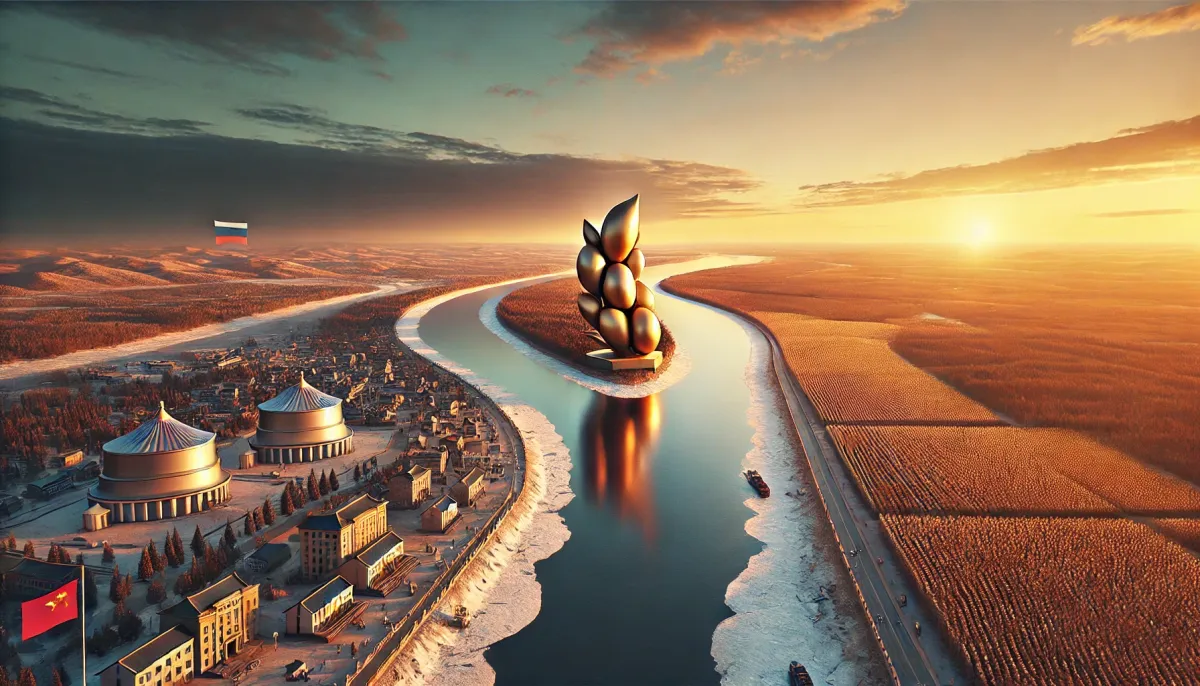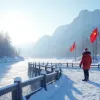Hey everyone, Mark here! I'm an American backpacker, and my recent adventure took me to the incredible Heilongjiang River, the natural border separating Russia and China. This trip far exceeded my expectations – a whirlwind of stunning scenery, unique cultural encounters, unbelievably delicious food, and a profound sense of history. It was an adventure I'll never forget.
From Humble Beginnings in Jiayin County to the Northernmost City of Heihe
My journey began in Jiayin County, a relatively quiet town located along the river's course. From there, my bus journey north was a stunning visual tapestry. Endless fields stretched as far as the eye could see, giving way to quaint, sometimes dilapidated, villages and towns clinging to the riverbanks. The air held a crisp, clean quality, carrying the scent of pine and the promise of adventure. Eventually, I arrived in Xunke County, a place known locally as the "Hometown of Red Agate." The name itself hinted at the unique treasures hidden within this region.
Exploring the Cultural Melting Pot of Xunke County
I took some time to explore Xunke, which gave me the opportunity to visit the remarkable first Russian ethnic village in China. The blend of cultures was incredibly captivating— a testament to the historical interactions between these two nations. The journey to the village itself was an adventure, weaving through a landscape that seamlessly blended Chinese farming traditions with the rugged, untouched beauty of the Northern reaches. Later, I continued my northward trek, eventually arriving in Heihe City, the undisputed northernmost city in China, sitting directly opposite Blagoveshchensk, Russia. It's a truly extraordinary border city, a bustling center of trade and a fascinating blend of cultures. It's a place where residents effortlessly cross the river for breakfast or the daily morning market – a truly unique sight. Heihe, formerly known as Aihui, also holds a pivotal place in history as the location where the Treaty of Aigun was signed, and to this day, it remains a significant trading point between Russia and China.
A Scenic Drive and Unexpected Discoveries Along the Heilongjiang River
My journey from Jiayin to Xunke was a breathtaking experience in itself. The bus largely followed the Heilongjiang River, winding its way through picturesque villages and towns. I vividly remember passing through places like Xiangyang Township and the uniquely named Wuyun Town. The contrasting landscapes on either side of the river were a constant source of fascination. The Russian side presented a stark, almost untouched wilderness, sparsely populated and seemingly untouched by human hands. This contrasted sharply with the Chinese side, where small towns and villages were nestled along the riverbanks, reflecting a centuries-old history of settlement and resilience. The sheer scale of the Heilongjiang River—its width, its power—was something I'll never forget.
A Closer Look at Xunke County: Agate, Soybeans, and Heartwarming Encounters
Xunke County itself was a revelation. Much larger than the smaller villages and towns I'd already seen, Xunke offered a wider array of amenities and a bustling atmosphere. I spent several days exploring this county, and several highlights quickly stood out:
| Location | Detailed Description | My Personal Experience |
|---|---|---|
| Wuyun Town | A small, almost forgotten town directly bordering the Heilongjiang River. Its seemingly abandoned bus station stood as a silent testament to changing times and the impact of modernization on rural communities. | The air of quiet abandonment mixed with the stunning views from its location along the river. I still remember the stark warning signs regarding illegal border crossings, adding a touch of intrigue and tension to the atmosphere. |
| Xunke County Town | A vibrant hub of activity, with a bustling market and a unique mix of traditional and modern architecture. I found a small, surprisingly comfortable guesthouse for 60 yuan a night. | The town's energy was contagious. I spent hours wandering the streets, observing daily life, and soaking up the atmosphere of this remote, yet surprisingly vibrant, location. The food was excellent; the people were incredibly kind and welcoming. |
| Bianjiang Village | A remarkable village, home to China's first Russian ethnic group. It stands as a testament to cross-cultural exchange, tolerance, and the enduring strength of human connection. | This village alone deserves its own detailed blog post! The people were incredibly welcoming, and I learned so much about their history, traditions, and unique way of life. (Coming soon!) |
| Heilongjiang Riverbank | Dramatic views of the river itself, its vastness, and the distant Russian landscape beyond. A huge soybean sculpture serves as a visible symbol of the region's agricultural heart. | The sheer scale of the river is breathtaking, and the contrasting landscapes on either side are stunning. The soybean sculpture is a local landmark, representing the region’s important agricultural heritage. |
More than Just a Trip: People, Stories, and Unexpected Connections
Xunke County wasn't just about stunning scenery. It was about the people I met. I shared conversations with farmers who spoke passionately about their harvests and the struggles of fluctuating market prices. I engaged with local artisans who shared their pride in their red agate craftsmanship. I even met someone who seemed to be of mixed Russian and Chinese ancestry, a beautiful example of the human interactions that have shaped this unique border region for generations.
Xunke's Red Agate Legacy: A Deep Dive into History and Industry
Xunke County is renowned for its red agate production, and I had the chance to delve into this local industry. The numerous shops and workshops dedicated to agate processing were fascinating to explore. I visited a workshop to learn about the multifaceted process of transforming raw agate into polished gems. It's a meticulous process, involving cutting, grinding, polishing, and drilling – each step crucial to creating the final product. Prices varied enormously, from affordable smaller pieces to thousands of dollars for exceptional pieces. This experience truly highlighted the skilled craftsmanship and rich history associated with Xunke's red agate.
Heihe City: A Border Town with Unexpected Charms
My journey ultimately led me to Heihe City, where the proximity to Russia was immediately striking. It felt like Russia was practically within arm's reach. I spent days exploring this city—the market, the street food stalls, and the mesmerizing riverfront views. Heihe's atmosphere is unlike any other I've experienced— a palpable blend of history, vibrant culture, and the ever-present presence of the Russian border. The city itself was an exciting mix of modern and traditional buildings, and the locals were welcoming and friendly. The food, as you can imagine, was an eclectic mix of Chinese and Russian influences, an unusual treat that only a border town could offer. I have lots more to share about Heihe in future posts!







